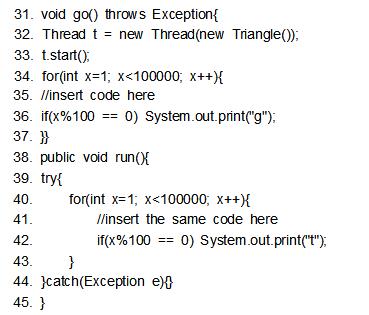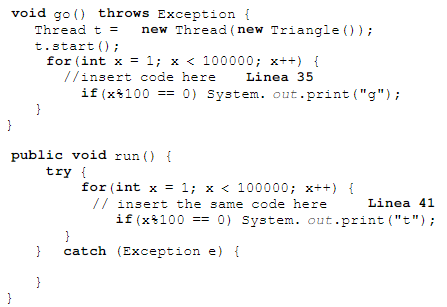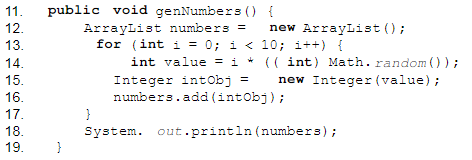Given:
11.String test = "Test A. Test B. Test C.";
12.// insert code here
13.String[] result = test.split(regex);
Which regular expression, inserted at line 12,correctly splits test into "Test A","Test B",and "Test C"?()
Given that Thing is a class, how many objects and reference variables are created by the following code?()
Thing item, stuff;
item = new Thing();
Thing entity = new Thing();
class java {
public static void main(String [] java) {
for (int Java = 1; Java 〈 java.length; Java++)
System.out.print("java ");
}
}
和命令行:
java java java java java
结果为:()
Given:

What, inserted at line 39, will sort the keys in the props HashMap?()
Given that Triangle implements Runnable, and:

Which two statements, inserted independently at both lines 35 and 41, tend to allow both threads to temporarily pause and allow the other thread to execute?()
Given that Triangle implements Runnable, and:

Which two statements, inserted independently at both lines 35 and 41, tend to allow both threads totemporarily pause and allow the other thread to execute?()
Given:

Which line of code marks the earliest point that an object referenced by intObj becomes a candidate for garbage collection?()
You are designing a top-level OU structure to meet the business and technical requirements.
Which top-evel OU or OUs should you use? ()
Given:
12.Date date = new Date();
13.df.setLocale(Locale.ITALY);
14.String s = df.format(date);
The variable df is an object of type DateFormat that has been initialized in line 11.
What is the result if this code is run on December 14, 2000?()
12. Date date = new Date();
13. df.setLocale(Locale.ITALY);
14. String s = df.format(date);
The variable df is an object of type DateFormat that has been initialized in line 11. What is the result if this code is run on December 14, 2000?()
Given the following RMAN commands,choose the option that reflects the order required to restore your currently operational ARCHIVELOG-mode database.()
a. restore database
b. recover database
c. shutdown immediate
d. startup
e. restore archivelog all
f. alter database open
public class TestOne {
public static void main (String[] args) throws Exception {
Thread.sleep(3000);
System.out.println(”sleep”);
}
}
What is the result?()
public class A extends Thread {
A() {
setDaemon(true);
}
public void run() {
(new B()).start();
try {
Thread.sleep(60000);
} catch (InterruptedException x) {}
System.out.println(“A done”);
}
class B extends Thread {
public void run() {
try {
Thread.sleep(60000);
} catch (InterruptedException x) {}
System.out.println(“B done”);
}
}
public static void main(String[] args) {
(new A()).start();
}
}
What is the result?()

Given:
11. public void genNumbers() {
12. ArrayList numbers = new ArrayList();
13. for (int i=0; i<10; i++) {
14. int value = i * ((int) Math.random());
15. Integer intObj = new Integer(value);
16. numbers.add(intObj);
17. }
18. System.out.println(numbers);
19. }
Which line of code marks the earliest point that an object referenced by intObj becomes a candidate for garbage collection?()
阅读以下代码:
public class Test{
public static void main(){
System.out.println(“x=”+x); } }
请问,代码运行的结果是?()
1. class Pizza {
2. java.util.ArrayList toppings;
3. public final void addTopping(String topping) {
4. toppings.add(topping);
5. }
6. }
7. public class PepperoniPizza extends Pizza {
8. public void addTopping(String topping) {
9. System.out.println(”Cannot add Toppings”);
10. }
11. public static void main(String[] args) {
12. Pizza pizza = new PepperoniPizza();
13. pizza.addTopping(”Mushrooms”);
14. }
15. }
What is the result?()
Assuming that the serializeBanana2() and the deserializeBanana2() methods will correctly use Java serialization and given:
import java.io.*;
class Food {Food() { System.out.print(”1”); } }
class Fruit extends Food implements Serializable {
Fruit() { System.out.print(”2”); } }
public class Banana2 extends Fruit { int size = 42;
public static void main(String [] args) {
Banana2 b = new Banana2();
b.serializeBanana2(b); // assume correct serialization
b = b.deserializeBanana2(b); // assume correct
System.out.println(” restored “+ b.size + “ “); }
// more Banana2 methods
}
What is the result?()
1. public class SimpleCalc {
2. public int value;
3. public void calculate() { value += 7; }
4. }
And:
1. public class MultiCalc extends SimpleCalc {
2. public void calculate() { value -= 3; }
3. public void calculate(int multiplier) {
4. calculate();
5. super.calculate();
6. value *=multiplier;
7. }
8. public static void main(String[] args) {
9. MultiCalc calculator = new MultiCalc();
10. calculator.calculate(2);
11. System.out.println(”Value is: “+ calculator.value);
12. }
13. }
What is the result?()
现有:
public interface A {}
以下哪项声明是合法的?()
class Birds {
public static void main(String [] args) {
try {
throw new Exception();
} catch (Exception e) {
try {
throw new Exception();
} catch (Exception e2) { System.out.print("inner "); }
System.out.print("middle ");
}
System.out.print("outer ");
}
}
结果为:()
Given:
11. static class A {
12. void process() throws Exception { throw new Exception(); }
13. }
14. static class B extends A {
15. void process() { System.out.println("B "); }
16. }
17. public static void main(String[] args) {
18. A a = new B();
19. a.process();
20. }
What is the result? ()
public class Test {
public static void aMethod() throws Exception {
try {
throw new Exception();
} finally {
System.out.println(“finally”);
}
}
public static void main(String args[]) {
try {
aMethod();
} catch (Exception e) {
System.out.println(“exception”);
}
System.out.println(“finished”);
}
}
What is the result?()
现有:
void topGo() {
try {
middleGo();
} catch (Exception e) {
System.out.print("catch");
}
}
void middleGo() throws Exception {
go();
system.out.print("late middle");
}
void go() throws ExceptiOn {
throw new Exception();
}
如果调用 topGo () ,则结果为:()
11. static class A {
12. void process() throws Exception { throw new Exception(); }
13. }
14. static class B extends A {
15. void process() { System.out.println(”B”); }
16. }
17. public static void main(String[] args) {
18. new B().process();
19. }
What is the result?()
11. static classA {
12. void process() throws Exception { throw new Exception(); }
13. }
14. static class B extends A {
15. void process() { System.out.println(”B “); }
16. }
17. public static void main(String[] args) {
18.A a=new B();
19. a.process();
20.}
What is the result?()
import java.io.IOException;
public class ExceptionTest(
public static void main (Stringargs)
try (
methodA();
) catch (IOException e) (
system.out.printIn(“Caught IOException”);
) catch (Exception e) (
system.out.printIn(“Caught Exception”);
)
)
public void methodA () {
throw new IOException ();
}
What is the result?()
1. class Exc0 extends Exception { }
2. class Exc1 extends Exc0 { }
3. public class Test {
4. public static void main(String args[]) {
5. try {
6. throw new Exc1();
7. } catch (Exc0 e0) {
8. System.out.println(“Ex0 caught”);
9. } catch (Exception e) {
10. System.out.println(“exception caught”);
11. }
12. }
13. }
What is the result?()
11.classA {
12. public void process() { System.out.print(”A “); } }
13. class B extends A {
14. public void process() throws RuntimeException {
15. super.process();
16. if (true) throw new RuntimeException();
17. System.out.print(“B”); }}
18. public static void main(String[] args) {
19. try { ((A)new B()).process(); }
20. catch (Exception e) { System.out.print(”Exception “); }
21. }
What is the result?()
11.classa {
12. public void process() { System.out.print(”a,”); } }
13. class b extends a {
14. public void process() throws IOException {
15. super.process();
16. System.out.print(”b,”);
17. throw new IOException();
18. } }
19. public static void main(String[] args) {
20. try { new b().process(); }
21. catch (IOException e) { System.out.println(”Exception”); } }
What is the result?()
Class TestException
1. public class TestException extends Exception {
2. } Class a:
1. public class a {
2.
3. public String sayHello(String name) throws TestException {
4.
5. if(name == null) {
6. throw new TestException();
7. }
8.
9. return “Hello “+ name;
10. }
11.
12. }
A programmer wants to use this code in an application:
45. A a=new A();
46. System.out.println(a.sayHello(”John”));
Which two are true?()
Given:
11.String test = "Test A. Test B. Test C.";
12.// insert code here
13.String[] result = test.split(regex);
Which regular expression, inserted at line 12,correctly splits test into "Test A","Test B",and "Test C"?()
String foo = “blue”;
Boolean[]bar = new Boolean [1];
if (bar[0]) {
foo = “green”;
}
What is the result? ()
Given the Tag:
Assuming the tag referenced by my Tags: get Advice uses the Classic event model,
which is true?()
免费的网站请分享给朋友吧